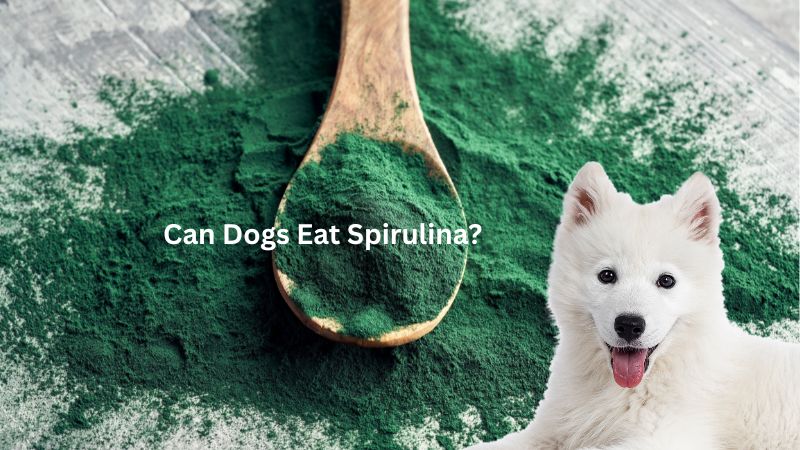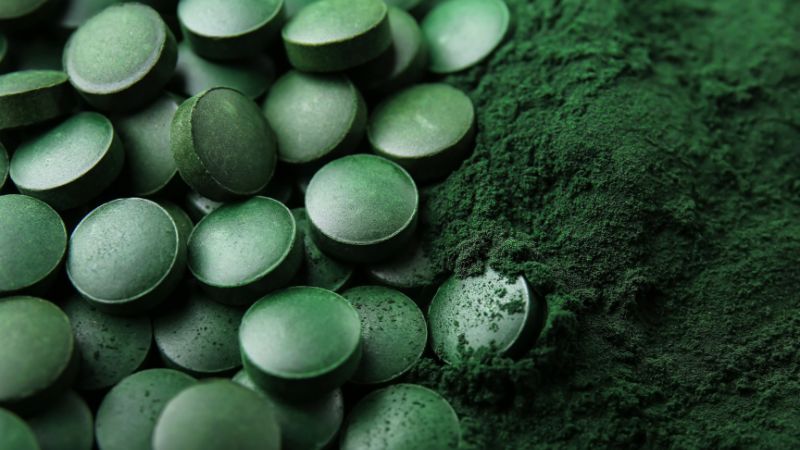
There are many functional foods we consume that are safe for our dogs and have excellent results.
I will cover three incredible greens in this series: spirulina, chlorella, and moringa.
As we discuss their advantages, how to include them in the diet of the hairy, and if there are any contraindications, let us look into their benefits. In this initial section, I will explain Spirulina to you.
Can Dogs Eat Spirulina?
The answer is yes, but in a very small amount.
What is Spirulina?
Spirulina belongs to the cyanobacteria family as a simple microorganism without cell walls.
It was referred to as blue-green seaweed, although technically, it is not seaweed. In Latin, Spirulina means spiral, which describes the shape of this organism under a microscope, and its scientific name is Arthrosporic platensis.
Spirulina has gained attention as a functional ingredient, but its use as food dates back thousands of years.
What a feast! Several researchers claim that Spirulina’s nutritional density is so absurd that it could drastically reduce malnutrition in underprivileged populations.
A little spirulina in your dog or cat’s diet can make a huge difference in his diet’s macro and micronutrient profile. The dose of only 10g powdered Spirulina concentrates.
Nutritionally, Spirulina has many benefits.
- 10x more beta-carotene than carrots!
- Vitamin K 109mcg
- 2mcg vitamin B12
- Calcium 46 mg
- Phosphorus 96 mg
- Iron is 8.7mg
- Magnesium 31.9 mg
- Zinc 145mcg
- 326mcg manganese
- 40mcg chromium (helps control blood sugar rates)
- 166mg potassium
- Iodine 14mcg
- Sodium 64 mg
Nutrition Data reports that 10g of Spirulina also provides 82mg of omega-3 fatty acids!
And phytonutrients:
- C-phycocyanin is 17% of Spirulina’s most abundant protein and is full of properties)
- Chlorophyll content of 1.2% (which can reverse anemia and remove heavy metals and toxins)
- Superoxide dismutase 53,100IU (a powerful antioxidant)
- Gamma-linolenic acid 108mg (anti-inflammatory and anti-tumor effects)
- Total carotenoids: 50.4 mg (protect against free radicals and premature aging)
- Zeaxanthin 10mg (prevents cataracts)
How safe is Spirulina for dogs?
Most Spirulina’s weight consists of protein, making it highly digestible and complete for dogs.
(As taurine is missing in every homemade diet, it should be supplemented.)
Spirulina’s unique nutritional profile makes it a perfect supplement for pets, including dogs and cats, who cannot tolerate liver.
Spirulina tastes pleasant and is accepted by dogs if mixed with food.
Could we discuss the therapeutic effects of Spirulina?
The benefits of Spirulina for animals
In a study of cats, spirulina administration improved the performance of macrophages, cells that fight bacteria and viruses.
Researchers found that she could even make bone marrow accept it.
Spirulina made the medulla in dogs whose bone marrow had been impaired by chemotherapy and radiation resume producing red and white blood cells.
Take a look at this example of recovering lost abilities.
In rats with encephalomyelitis, C-phycocyanin, the main protein in Spirulina, was one of the few treatments capable of regenerating the myelin sheath.
(The myelin sheath is a fat cap that surrounds nerve cells and allows the spread of nerve impulses.)
Treatment of stroke with Spirulina
Excellent news for multiple sclerosis patients and stroke survivors, both animals and humans, right?
In pre-flu mice, Spirulina reduced the virus’ multiplication and even reduced mortality from influenza.
The treatment may prove to be a promising adjuvant against feline viruses and respiratory conditions in dogs caused by viruses.
In another study, Spirulina was effective against 22 strains of candida Albicans yeast, the culprit behind vaginal candidiasis.
It may be good news for dogs suffering from otitis, a world of itching (and the smell of corn chips) caused by a Candida “cousin,” Malassezia pachydermatis.
The brain is very susceptible to the action of free radicals and the deposition of an abnormal substance called amyloid, which can lead to early cognitive dysfunction (a type of Alzheimer’s disease in dogs).
In mice with cognitive impairment, this cyanobacterium increased the production of antioxidants with neuroprotective action.
Spirulina helps diabetic and overweight pets.
Studies have shown that Spirulina can help diabetic dogs and overweight pets.
Horses with Equine Metabolic Syndrome, a condition similar to diabetes that produces obesity and systemic inflammation, have lost weight, and their insulin sensitivity has improved.
The mitochondria of these horses were better protected against free radicals, which means a reduction in cancer risk since the cause of this terrible disease is believed to be the failure of these organelles.
A study conducted on diabetic mice showed that Spirulina reduced pro-inflammatory cytokines produced by the disease.
The animals were better nourished, with higher blood zinc, copper, iron, and selenium levels and more enzymes with antioxidant effects.
In a study, Spirulina was found to be effective against human lung cancer cells without causing the side effects associated with chemotherapy.
Finally, we can’t help but praise Spirulina’s detoxifying properties.
Bangladesh’s aquifers are impure with arsenic, and intoxicated patients were rarely treated before the mid-1990s
In a three-month study, local researchers administered Spirulina to patients. Guess what? The condition of eighty-two percent of the staff who received Spirulina significantly improved.
Is Spirulina harmful to dogs?
50mg of Spirulina per kilo of weight is for dogs and cats.
Our dog Gini, who weighs 5kg, may require 250mg.
Start introducing the Spirulina slowly. The mineral cyanobacterium eliminates toxins, which can cause adverse reactions in more sensitive hair, such as diarrhea, flatulence (gases), and vomiting.
Start by administering 1/2 of the dose indicated to your pet’s weight once a week by fractionating this low dose into two meals.
Make it available twice a week. After that, you can go up to three times a week, and so on.
Make sure you know what your buddy’s tolerance threshold is. You should respect your cat or dog if it does not seem to tolerate the full dose well but seems to tolerate half of it.
It is not necessary to take spirulina every day. Two to three doses a week in hairy animals can significantly impact their diet and health.
Spirulina for dogs
Spirulina may not be suitable for pets with advanced kidney disease as very protein-rich food.
Due to Spirulina’s iodine content, this supplement is not safe for dogs with hypothyroidism.
Is Spirulina contraindicated for your pregnant dog, cat, or hairy disease carrier? Be sure to consult your trusted veterinary doctor.
Also, a check if one can dog eat peas
conclusion
For a final note, make sure your Spirulina comes from a reliable source.
Buy certified organic spirulina powder grown in contamination-free regions.
Spirulina grown in polluted environments can contaminate residues, toxins, and heavy metals. You find this green in natural, physical, and online stores.




Leave a Reply